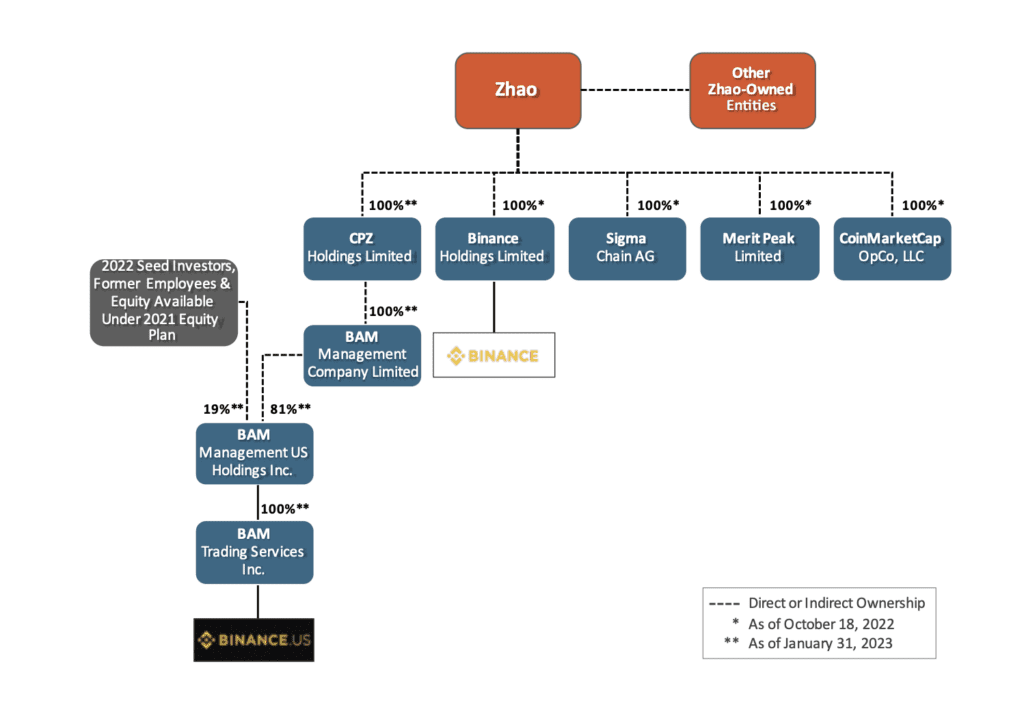Key Points:
- Binance is currently facing a legal battle started by the SEC with more than 13 allegations related to the exchange.
- CZ is said to run money-laundering companies and use Tai Chi as a scheme to enter the US market.
- The outcome of this battle is important to the crypto market.
On Monday, U.S. Securities and Exchange Commission filed 13 accusations against Binance, the world’s largest cryptocurrency exchange, as well as its wealthy co-founder and CEO, Changpeng Zhao, also known as CZ. That is the latest in a series of moves launched against cryptocurrency firms.

CZ runs money-laundering companies
The SEC detailed the details of Binance and CZ’s violations in the 136-page lawsuit filed in federal court in the District of Columbia, including operating an illegal trading platform in the United States; operating an unregistered exchange, broker-dealer, and Clearinghouses; misappropriation of client funds; unregistered securities offerings and sales, and more.
“Through thirteen charges, we allege that Zhao and Binance entities engaged in an extensive web of deception, conflicts of interest, lack of disclosure, and calculated evasion of the law. They attempted to evade U.S. securities laws by announcing sham controls that they disregarded behind the scenes so they could keep high-value U.S. customers on their platforms,” SEC Chair Gary Gensler said in a statement.
The SEC accused CZ and the exchange, like previous Binance rival FTX and its creator Sam Bankman-Fried, of exerting control over client funds, enabling them to mix or transfer customer assets at whim, including transfers to CZ’s ownership and control. Sigma Chain is a being.
BAM Trading and BAM Management US Holdings, Inc. (BAM Management) are also accused of deceiving investors about non-existent trading restrictions on the Binance.US platform, while Sigma Chain participated in manipulative trading, artificially boosting the platform’s trading volume, and only in 2022. Sigma Chain accounts were actively traded on 48 of 51 newly issued crypto assets between January 1 and June 23, 2022.
The lawsuit further claims that the defendants mixed and transferred billions of dollars in investor assets to another firm, Merit Peak Limited, which is managed by CZ and seems to be used to purchase and sell cryptocurrencies.
According to reports, CZ and his holding firm own 100% of Binance and Binance.US.
The SEC also claims the exchange, among other things, of improperly permitting high-profile US corporations to trade on Binance.com and of commingling client funds between its US and non-US organizations. Binance.US characterized the SEC’s lawsuit as “baseless,” while the exchange dismissed its attempts to seek a settlement with the agency.
In addition, the SEC stated that at least $145 million was moved from Binance.US accounts to Sigma Chain accounts in 2021. Another $45 million was placed into the account via a Nevada trust linked to Binance.US, and Sigma Chain used $11 million from the account to buy a boat.
It’s also worth noting that, similar to the confusing structure of FTX and FTX.US, the SEC contends that the exchange had access to Binance.US’ wallets and assets, as well as the custodial tools and private keys of the U.S. firm. The exchange is also the designated custodian for crypto assets deposited, kept, traded, and accumulated on the Binance.US platform until December 2022, at the very least. Changpeng Zhao approved various trading-related choices on the Binance.US platform, including the client account establishing procedure, front-end access development, and the building of reserves to support ACH deposits.
The SEC has requested that the court order an immediate verification accounting of Binance and Binance.US’s finances, asset freezing and return, document preservation, and the appointment of a receiver for the exchange’s assets.

Former Binance.US CEO Brian Brooks was mentioned in a transcript connected to exhibit papers in the SEC’s complaint against the exchange, BAM Trading, BAM Management, and Zhao.
When asked about his job as CEO of Binance.US, Brooks stated:
“I did not work for Binance.com, that nobody at Binance.com was my boss, and that my role was to complete and highlight the corporate separateness. So when I talked to CZ, I considered myself to be talking to him in his role as board chair BAM Trading.”
“What became clear to me at a certain point was [that] CZ was the CEO of BAM Trading, not me…That wasn’t because Binance.com somehow controlled us, but again, he owns the vast majority of Binance.com so I put that aside,” he continued.
“Tai Chi” plan to attract American customers
According to the SEC’s 13-count complaint, the issue stems from the company’s blatant contempt for federal securities laws, and the exchange and CZ have enriched themselves by billions of dollars while putting investors’ funds at severe risk.
The so-called “Tai Chi strategy,” which Forbes first reported on January 2020, looks to be the exchange’s intention to publicly exit from the US market while keeping a presence via associated entities. Binance sued Forbes for the claim in November 2020 but dropped the action in February 2021.
According to the lawsuit, internal exchange personnel explored strategies to enable US users to trade on Binance.com.
The exchange stated:
“The SEC’s actions here appear to be part of a rushed effort to claim jurisdictional ground from other regulators—and investors do not appear to be the SEC’s priority.”
In essence, Binance carried out most of the Tai Chi plan, Zhao and the exchange retained extensive engagement and control over the U.S. firm, and Zhao instructed Binance to approve and conceal numerous high-value transactions, according to the SEC.
According to the lawsuit, the exchange earned $11.6 billion in income from June 2018 to July 2021, the majority of which came from trading fees. Binance.US had its own OTC trading desk. Alameda Research, created by FTX founder Sam Bankman-Fried, is the transaction’s counterparty.

At least 12 tokens are securities on the exchange
The SEC views Binance.US’s BNB, BUSD, and collateralized investment products to be unregistered securities. It also stated that BAM Trading’s pledge program qualified as an investment contract under its definition of security.
According to the lawsuit, the exchnage and BAM Trading unlawfully offered and sold crypto-asset securities, including the exchange’s own BNB and BUSD, as well as Binance’s earning programs BNB Vault and Earn and the so-called “cryptocurrency” accessible on Binance.US website.
In the complaint, the SEC classifies the following tokens as securities: BNB, BUSD, Solana (SOL), Cardano (ADA), Polygon (MATIC), Filecoin (FIL), Cosmos Hub (ATOM), The Sandbox (SAND), Decentraland (MANA), Algorand (ALGO), Axie Infinity (AXS), and Coti (COTI).
Significantly, Ethereum was not named as a security in the SEC’s case. At a nearly five-hour hearing in April, SEC Chairman Gary Gensler refused to say if ETH constituted a security.
Is this the conclusion of the story?
The SEC and CFTC have been fighting over who will be the principal regulator of cryptocurrency trading. In March of this year, the CFTC charged the exchange and Zhao, with violating federal law by offering unregistered crypto derivatives. Several of the SEC’s claims are identical to those of the CFTC. It has control over the cryptocurrency business, according to another large bet.
The SEC wants to prohibit Binance, Binance.US, and their respective agents from violating federal law by ordering the defendants to pay any ill-gotten proceeds plus prejudgment interest in the action. Some optimistic feel that the claim is a civil complaint and that the exchange would be fined heavily.
Yet, others speculate that the exchange may be permanently barred from accessing the American market. In the filing, the SEC said that it seeks to bar CZ from acting as an officer or director of any securities issuer, as well as to prohibit Binance, Binance.US, and CZ from dealing in or trading in any securities, including encrypted asset securities. According to the complaint, this includes prohibiting the defendants from working as an unlicensed broker, clearing house, or dealing with any crypto asset securities.
Binance has been accused by both the CFTC and the SEC of failing to comply with US anti-money laundering legislation. The United States Treasury Department, which supervises the majority of the country’s anti-money laundering apparatus, has yet to reply. If the exchange is accused of breaking sanctions, the majority of the evidence in the civil complaint might be published. Used to support separate Treasury and Justice Department enforcement proceedings.
The exchange has said that it expects the United States Congress would step in and adopt bipartisan legislation to build a functional regulatory framework for digital assets, preventing the crypto sector from becoming a victim of bureaucratic overreach.
DISCLAIMER: The information on this website is provided as general market commentary and does not constitute investment advice. We encourage you to do your own research before investing.
Join us to keep track of news: https://linktr.ee/coincu
Harold
Coincu News






















